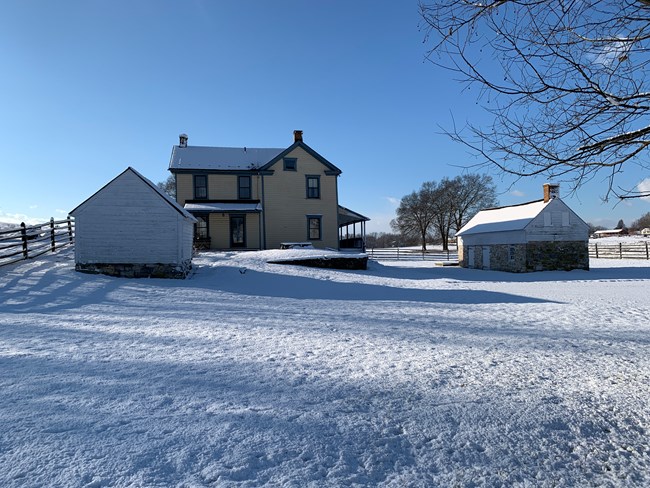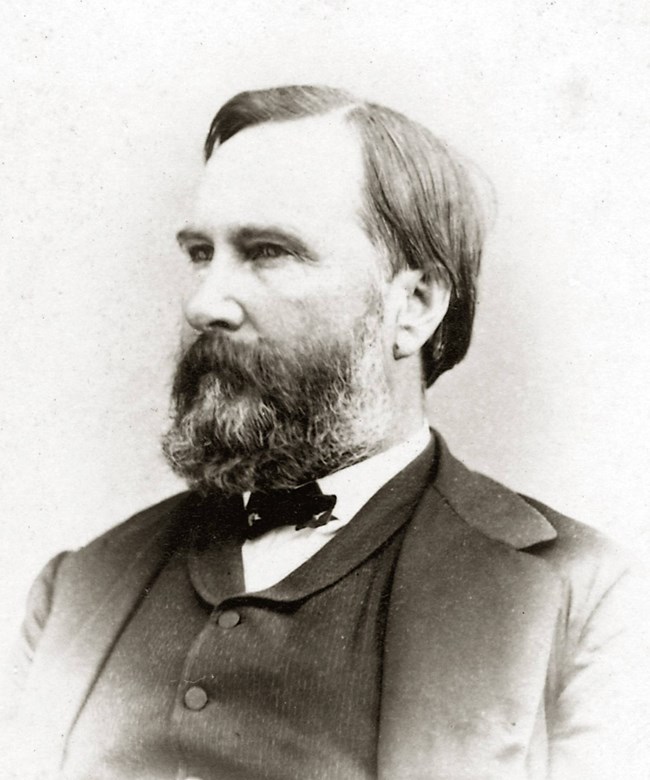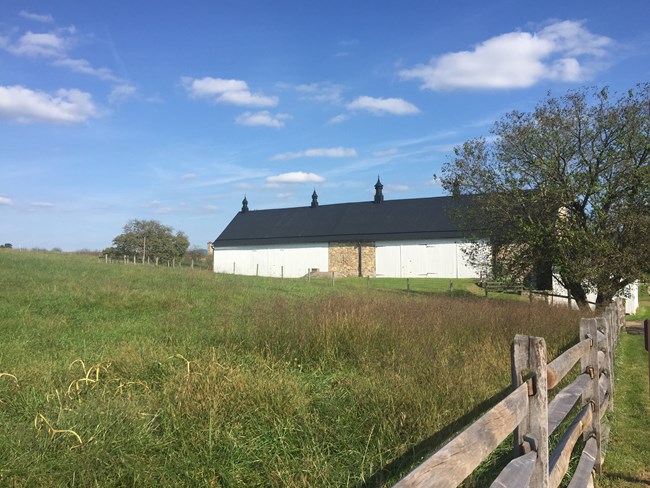
NPS Antietam / B.Baracz The Henry Piper Farm and FamilyOn the morning of September 19, 1862, the detritus of a bloody battle was very evident in the small town of Sharpsburg, Maryland. The heavy scent of wood smoke and decaying flesh consumed the small community located near the Potomac River and Antietam Creek. Leaving his brother Samuel’s farm near the river, Henry Piper and his wife Betsy, made their way to their farm located on the other side of town near the Hagerstown Pike. Both prayed that the main house and outbuildings had not been destroyed by the event that took place on the previous Wednesday, September 17. The Maryland CampaignIt had been a week filled with terror for the Piper family. On Monday, September 15, the vanguard of the Army of Northern Virginia arrived in the Antietam Valley following a battle on South Mountain. That afternoon, Confederate Generals James Longstreet and Daniel H. Hill found their way to the Piper home and informed Mr. Piper that his residence was selected as their headquarters. Staff officers, orderlies, soldiers and horses soon established themselves around the house as the army prepared for battle. Although Henry Piper was known in the community as an ardent Unionist, he felt it prudent to welcome his unexpected guests with dinner and other refreshments. As dinner was served, the Piper sisters offered the generals some of their homemade wine. General Longstreet politely refused the offer, but General Hill had no qualms and drank from the cup offered to him. After seeing no ill effect on Hill, Longstreet changed his mind saying, ”Ladies, I will thank you for some of that wine.” Warned by the Confederates of the approaching battle, the couple, three of the six children and the enslaved people residing on the farm “quickly packed what they could carry into a wagon, and Elizabeth buried her dishes in the ash pile”. Mary Ellen Piper remembered their flight: “We left everything as it was on the farm, taking only the horses with us and one carriage”. The Pipers headed first to the Killiansburg Cave along the Potomac River but eventually took shelter at the Samuel Piper farm. 
NPS Antietam The BattleThe Henry Piper Farm was centrally located astride Lee’s defensive line on September 17. From a plateau behind the Piper farmhouse, General Lee and Major General Longstreet saw the columns of Union troops on his front and his flanks. In addition, Confederate artillery batteries sited their targets from this high ground. By 9:00 A.M., two Confederate brigades anchored down the so-called “Sunken Road,” six hundred yards north of the Piper Barn, and it served as a fall back position for troops engaged to the North. Major General William French and Major General Richardson drove their divisions towards the Sunken Road through the Mumma and Roulette Farms beginning at 9:30 A.M. Meanwhile, Confederate Major Gen. Richard Anderson maneuvered his division around and through the Piper buildings and orchard. These Confederate regiments withstood the fire of four Union batteries of twenty-pound Parrot rifled cannons coming at them from a distance of two miles on their right. By 11:00 A.M., the Sunken Road had become a death trap for the Confederate defenders. Receiving fire from three different directions, the Confederate battle line broke for the rear through the Piper Orchard towards the Hagerstown Pike. Hit by a Confederate shell fragment, Major General Richardson was mortally wounded and carried from the field. Major General George McClellan ordered his replacement, Major General Winfield S. Hancock, to call off the attack and consolidate the Union position north of the Sunken Road. That evening, the 7th Maine Regiment of the Sixth Corps received an order to advance towards the Piper Barn. The Confederates drove back the ill-fated attack, which resulted in many Union casualties. The following day, neither side renewed the battle, and the Piper farm became a no man’s land between the lines. On the evening of the 18th, Lee took his army back across the Potomac River and returned to Virginia. On September 19, the farmers and townspeople of Sharpsburg warily returned to their houses and farms. The Pipers were relieved to find their house, barn and out buildings still standing. Inside their home, however, laying underneath their prized piano were two dead Confederate soldiers. The Pipers’ personal possessions were strewn around the buildings and Union soldiers were butchering the livestock that had not been driven off. Their farm and their lives were in shambles. The Union army stayed in Sharpsburg for the next six weeks. 
NPS Antietam / B.Baracz AftermathEventually, Henry Piper filed a claim to the federal authorities for assorted damages to his property and livestock. Although the board of claims awarded him $2,488, he did not receive payment because he did not produce a certificate of loyalty. Twenty-four years later, Henry sued the U.S. Government and one of the witnesses was former enslaved person Jeremiah Summers. Henry and Elizabeth moved to Sharpsburg in 1863 and resided at a house they had purchased in 1857 following the death of Henry’s father. This house is still located at the corner of Main and Church streets in Sharpsburg. In April of 1864, a company of the 19th United States Colored Troops headquartered at the Methodist Episcopal Church in Sharpsburg was accused of seizing “diverse colored men, free and slave” for service in the Union army. One of those men was young Jeremiah Summers who was only 15 at the time. Henry Piper found the lad at the church headquarters and took him back to the farm. Piper claimed that Jeremiah could not serve because of his age. Not convinced, eight soldiers from the company roughed him up and put him under arrest. He was released on the condition that he produce Jeremiah. The soldiers took Jeremiah away as the people of Sharpsburg townspeople loudly objected.Henry journeyed to Frederick, Maryland and voiced his complaint to the Provost Marshal who thereupon released Jeremiah to his custody. Later, many citizens of Sharpsburg submitted a petition to Major General Lew Wallace and demanded an investigation. After Maryland emancipated slaves in 1864, Jerimiah continued to work and reside on the Piper Farm as a paid employee of Henry’s son Samuel. Henry retired to his elegant stone house and later employed Jeremiah’s son Emory. After Henry Piper’s death, he provided Jeremiah with a small cottage and garden near the Sunken Road. Jeremiah Cornelius Summers died in 1925 at the age of 76 and is buried in the Tolson’s Chapel Cemetery of Sharpsburg. Elizabeth Piper died on January 19, 1887 and Henry succumbed five years later on January 14, 1892. The Piper Farm that Henry and Elizabeth bought from his father in 1854, was composed of 184 acres and had the only commercial apple orchard in that part of Washington County. Each fall, the cider press located near the stone barn produced many gallons of cider for sale. Six other buildings surrounded the modest farmhouse: the kitchen/enslaved quarters, root cellar, store house, smokehouse, and the barn. The slave quarters were located in the stone house west of the main house. In 1850, Henry owned four slaves and his father owned five slaves. To accommodate these two families, the quarters were divided into two sections with a loft above each section. By 1860, there were six slaves on the farm, five of them children. A kitchen was also located in this building. The Pipers also employed a sixteen year old free black farm hand named John Jumper. The main house had two levels and a root cellar. The second level included the parents’ and children’s rooms. On the first level was the parlor and the center of activity. The piano provided hours of entertainment for the family and guests. The Piper Farm remained in the family until 1960. The Park Service bought the property from the Antietam-Sharpsburg Museum, Inc. in 1964 for $75,000. The legacy of the Piper family lives on to this day. The Park Service leases out the fields to area farmers and the apple orchard has been re-planted. As the seasons, change, the memories of the hardships that the Pipers and their neighbors endured will never be forgotten. 
NPS Antietam / K.Snyder |
Last updated: September 15, 2023
